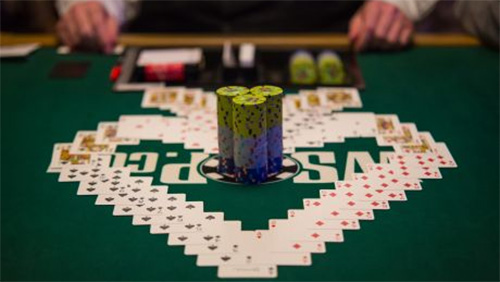Lee Davy sits down with the PokerNews Editor-in-Chief, Donnie Peters, to discuss the success of the recent World Series of Poker (WSOP) Dealers Choice (DC) event, and how the PokerNews team adapted to create coverage for a never before seen event.
 When the World Series of Poker (WSOP) released the schedule for the 45th annual series, the event that stood out for me was Event #41: $1,500 Dealers Choice (DC) – Six-Handed.
When the World Series of Poker (WSOP) released the schedule for the 45th annual series, the event that stood out for me was Event #41: $1,500 Dealers Choice (DC) – Six-Handed.
Why?
I firmly believe it’s the future of poker.
I don’t know about the rest of the world, but when I walk into the local card rooms in South Wales the cash games are dominated by games of DC.
Once described as the Cadillac of Poker, No-Limit Hold’em (NLHE) is starting to become a little bit like sex with your husband of 40-years.
It’s boring, predictable and monotonous.
DC is hot, raucous and sexy.
Our first-ever DC champion is Robert Mizrachi – who stepped out from underneath the shadow of his brother long enough to defeat 419 entrants and scoop the $147,092 first-prize.
Hosting an event for the first time can be a logistical nightmare, but so far the reports circulating around Social Media all point to a job well done for the entire WSOP team.
But there is another group of people who also deserve special credit. They are there before you arrive, and they are there long after you have left. The people who pass you like ghosts in the wind. You don’t see them, but they always have their eyes on you.
I am talking about the PokerNews crew, and I sat down with their Head Honcho, Donnie Peters, to get the lowdown on how the event went down from their perspective.
“When I am putting the team together for the summer, I always try and gauge everybody’s knowledge of all the games. In previous years we have contended with 6-7 games in total. This year with the implementation of the DC event we were up to 16.” Said Peters.
“A lot of these games like: Baduci, Badecey or Ace-to-Five Draw. They are not played online, nor are they played in live events around the world. So it’s tough to find people who know these games.
“Josh Cahlik was our lead guy on these events, and he got help from Mo Nuwwarah. Both of them have really good knowledge of all poker games in general. Both were pretty open that they don’t know every little intricacy of every game involved, but I knew that their poker knowledge was good enough to watch a hand of Ace-to-Five Draw and realize that, ‘Ok this is similar to Triple Draw I just need to change a few things around and I’ve got this.’
“I have confidence in my guys that they can adapt on the fly to how things are going. This is a first time event so the way we craft our coverage is new to us. I told them going into it that they were the pioneers. I trusted them to do what they thought was right. It was a trial and error thing and it seems everyone who followed the coverage enjoyed it a lot.”
How did the players receive the coverage?
“It was very well received. One of the big thing about our coverage this year is we wanted to see how well received it was by the players and I think it we did a good job on that score.
“The only slight criticism that we heard from players was the size of the buy-in. A lot of the players who went deep said they would have preferred it if the event was a $3k or $5k buy-in. But the players we spoke to enjoyed it, enjoyed the variety of games, and were really complimentary about the WSOP staff.
“I counted that there were about eight floor staff at one point, and we usually have two-three, so they were well prepared. All the dealers seemed to do very well. I tweeted a joke prior to the event, ‘What the over/under was going to be on the number of floor calls?’ But there didn’t seem to be that many. The players also had a lot of patience, knowing it was a first time event, and they helped a lot.
“It was interesting to see how different tables interacted with each other. There was one table where everyone agreed to spread all the plaques out and pick a game at random – they were obviously having fun with it. Then someone would pick Badugi, and a person who had never played it before would end up liking it and then they would pick Badugi, and the whole table would end up playing Badugi for a while.
“There was a also a definite meta-game between what games to choose as the experienced players got deeper. Marco Johnson was talking about how he picked up on who was good at what game, and would choose Badugi if a player was no good at Badugi, for example. Then some of the other players, such as Allen Kessler, were picking games based on how best to leverage their stack size.
“There is so much NLHE these days, and PLO is going the same way. People get bored with it. When you play a mixed tournament you are playing different games, but there is a structure to it. In DC it can be anything, at any time, and you always have to be on your toes.
“There is a whole bunch of strategy that goes into it. I think it went really well and can evolve to become even better. Perhaps a $2.5k, $5k and then maybe a $10k Championship in the future – who knows?”